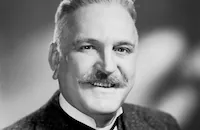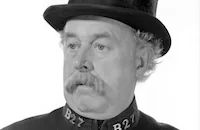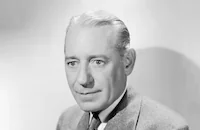White Cargo

Brief Synopsis
Cast & Crew
Richard Thorpe
Hedy Lamarr
Walter Pidgeon
Frank Morgan
Richard Carlson
Reginald Owen
Film Details
Technical Specs

Synopsis
Shortly after returning to a rubber plantation in the west African jungle, overseer Worthing chats with fellow Englishman Jim Fish about life on the plantation in 1910: Harry Witzel, the plantation's cynical overseer, and his assistant, Wilbur Ashley, await the arrival of the river boat, which is taking Ashley back to England after four years of service. Although Witzel is happy to see the whining Ashley leave, he dreads meeting Ashley's replacement, who is coming in on the boat. As Witzel explains to the plantation's alcoholic doctor, the replacement will be uninformed and unprepared, and will make the same insipid comments that all the new recruits make. Witzel's predictions prove accurate, when the replacement, Langford, bounds into Witzel's bungalow full of naïve enthusiasm, uttering inane remarks about the jungle. Although Witzel, who suffers from recurring bouts of malaria, tries to warn Langford about the "damp rot" that destroys white men's souls, Langford insists he is incorruptible. That night, Langford, Witzel, the doctor, Reverend Roberts, the local missionary, Skipper, the boat's captain, and his mate Ted share a farewell feast with Ashley. During the drunken festivities, the men discuss Tondelayo, a beautiful but greedy half-caste, who roams through the area bewitching lonely white men. Witzel, who also functions as the local magistrate, has banned Tondelayo from the district and tells Langford that she is a conniving seductress. After Ashley departs on the boat, Tondelayo sneaks into Langford's bungalow and introduces herself with an enticing smile. Concerned about Langford's obvious interest in Tondelayo, Witzel has her escorted out of the jungle, but not before Langford gives her some money. Five months later, Witzel criticizes Langford for allowing sixty percent of the rubber trees under his care to die. Although Langford insists that he merely needs to become "acclimatized," a word Witzel detests, Witzel accuses him of succumbing to "damp rot." Witzel calls Langford, who has started to drink heavily, lazy and incompetent, while Langford complains that Witzel is an ineffective supervisor. Soon after, Tondelayo returns to Langford's bungalow and tries to seduce him with her dancing. Langford does his best to resist, and when Witzel suddenly appears, she hides in his bedroom. Afraid of Witzel, who used to be her lover, Tondelayo convinces Langford to meet her in the jungle the next night, then disappears. Two months later, Tondelayo and Langford finally reunite in the jungle, but she still refuses to go near Witzel. Langford decides to solve the problem, and spite Witzel at the same time, by marrying Tondelayo. Shocked that he would consider marrying not only a self-serving temptress but a half-black as well, Witzel and the other whites try to talk him out of it. Langford, however, refuses to back down, especially after he learns that Tondelayo is actually half-Egyptian and half-Arabic. Five months later, "Mrs. Langford," as Tondelayo likes to call herself, complains to her husband that he is not giving her enough bangles and silk. The bored Tondelayo then slinks into Witzel's bungalow and tries to seduce him, but he coldly informs her that she is stuck with Langford "till death do you part." Moments later, Langford sees Tondelayo struggling with Witzel and, assuming the worst, attacks him. Witzel soon knocks Langford out, impressing Tondelayo. Taking Witzel's words to heart, Tondelayo acquires some deadly "berry juice" and begins to poison her husband. The doctor assumes Langford has contracted malaria and prescribes doses of quinine, which Tondelayo replaces with berry juice. Eventually, Witzel recognizes Langford's unusual symptoms and accuses Tondelayo of poisoning her now comatose husband. Although Tondelayo protests her innocence, Witzel forces her to drink the entire vial of juice. Her fatal punishment enacted, Tondelayo runs screaming into the jungle and collapses. Later, as Skipper loads his "white cargo," the recuperating Langford and the doctor, onto his boat, Witzel greets Langford's unsuspecting replacement, Worthing. In the present, Worthing concludes his story and yells at Jim when he uses the word "acclimatized."

Director

Richard Thorpe
Cast

Hedy Lamarr

Walter Pidgeon

Frank Morgan

Richard Carlson

Reginald Owen

Henry O'neill

Bramwell Fletcher
Clyde Cook
Leigh Whipper
Oscar Polk
Darby Jones

Richard Ainley
Emmett Smith
Martin Wilkins
John Burton
Ed Allen

James Davis
J. D. Jewkes
Crew
Daniel B. Cathcart
Jack Dawn
Cedric Gibbons
Keogh Gleason
Leon Gordon
Al Jennings
Kalloch
Bronislau Kaper
Ernst Matray
Maria Matray
Victor Saville
Douglas Shearer
Frederick Y. Smith
Harry Stradling
Edwin B. Willis

Photo Collections
Videos
Movie Clip


Trailer
Hosted Intro
Film Details
Technical Specs

Articles
White Cargo
Originally a novel by Ida Vera Simonton entitled Hell's Playground, this popular mixture of exotica, pulp thrills and over-the-top misogyny first gained popularity in 1923 under its more famous title as a stage play, then as a 1930 British film by J.B. Williams and A.W. Barnes that took seven years to reach American shores. This Hollywood version was adapted by the play's original author, Leon Gordon, a busy scribe through the early 1950s who also penned such films as Kim (1950). Well aware of the source material's absurdity, Lamarr undertook the lead role as a means of shattering her pristine, untouchable persona. "That name kills me," Lamarr reminisced of her jungle siren lead in her autobiography, Ecstasy and Me. "John [Loder] thought from the start I was ridiculous to play it, but there was so much sex in it I couldn't resist the temptation to kill the 'marble goddess image' for good!" However, the results failed to please her, causing her to declare "it was all hopeless... I know, though, in my coca-butter-smeared nudity I contributed to the war effort. Soldiers all over the world sent fan letters to Tondelayo." Lamarr also recalled an amusing anecdote from one critic's screening: "Critic George Jean Nathan listening to, 'Me Tondelayo. Me stay,' got up and said, 'Me George Jean Nathan. Me Go.' And he walked out of the theatre."
One of the most popular screen icons of the World War II era, the Austrian-born Lamarr (born as Hedwig Eva Maria Kiesler) began her career in a number of Czech and German films including 1933's notorious Ecstasy, where her nudity and sex scenes catapulted her to international stardom. Her Hollywood debut, Algiers, (1938) was a smash hit which enshrined her as one of the most striking beauties of her era. Her years at MGM resulted in a wide variety of titles including Boom Town (1940) and Ziegfeld Girl (1941), with White Cargo marking one of her most auspicious leads. However, after turning down a number of prize roles which would have expanded her dramatic range such as Casablanca (1942), her career went into decline after her final significant Hollywood lead in Samson and Delilah (1949). At the height of her popularity with White Cargo, Lamarr was also compelled to visit what she termed "my first in a long line of distinguished psychiatrists. This doctor... made me realize that in spite of my exalted position in the film world and the fact that so many people called me beautiful, I didn't believe it. It was his job to make me believe I was beautiful! As is usually the case I fell in love with him."
Along with an indelible female at its center, White Cargo boasts a fearless troupe of male supporting players familiar to many movie buffs. A busy character actor since the silent era, Walter Pidgeon anchors the film as the man in charge with a possible secret lust in his heart; though already familiar for his previous role in How Green Was My Valley (1941), his most famous work was yet to come as Dr. Morbius in Forbidden Planet (1956) and Florenz Ziegfeld in Funny Girl (1968). Reliable sci-fi actor Richard Carlson, who had appeared in the previous year's The Little Foxes (1941), became a familiar face on television and earned a soft spot in the hearts of baby boomers everywhere as the stalwart lead in Creature from the Black Lagoon (1954) and It Came from Outer Space (1953). As the plantation's resident physician, Frank Morgan will forever be remembered for the title role in 1939's The Wizard of Oz, as well as his classic turns in The Shop Around the Corner (1940) and his previous collaboration with Lamarr in Boom Town.
A controversial project from its inception, White Cargo originally established Tondelayo as a black native woman whose relationship with all of the white men around her carried an interracial charge far too potent for the Hays Code. Though the British version retains the original racial schematics of the source material, Hollywood had to tone it down by giving Tondelayo an unlikely but more "palatable" Egyptian parentage to appease the censors; also, a flashback structure was imposed on the story to convey its status as a moral lesson. However, none of these changes could suppress the essential heavy-breathing juiciness of the tale, a deliciously ripe relic from a time when everyone was all too eager to "go native." Producer: Victor Saville
Director: Richard Thorpe
Screenplay: Ida Vera Simonton (novel), Leon Gordon
Cinematography: Harry Stradling, Sr.
Film Editing: Fredrick Y. Smith
Art Direction: Cedric Gibbons
Music: Bronislau Kaper
Cast: Hedy Lamarr (Tondelayo), Walter Pidgeon (Mr. Harry Witzel), Frank Morgan (The Doctor), Richard Carlson (Mr. Langford), Reginald Owen (Skipper of the Congo Queen), Henry O'Neill (The Reverend Dr. Roberts).
BW-88m. Closed captioning.
by Nathaniel Thompson

White Cargo
Quotes
Trivia
Notes
Snippets of the song "Rootity-Toot, She Plays the Flute" and "Home, Sweet, Home" are heard in this film. According to the file on the film in the MPAA/PCA collection at the AMPAS Library, the miscegenation element of Leon Gordon's story caused great censorship difficulties, beginning with the U.S. distribution of a 1929 British screen adaptation of his play, also entitled White Cargo. As noted in articles included in the MPAA/PCA files, in accordance with the MPPA's 1924 agreement of self-imposed censorship, MPPA head Will Hays deemed the play unacceptable material for screen adaptation and effectively banned any studios from producing it. [In the play, "Tondelayo" is described throughout as a "negress."] The March 1930 New York release of the British film, which was directed by J. B. Williams and Arthur Barnes and starred Leslie Faber and Gypsy Rhouma, generated complaints from industry insiders, who felt that its distribution in the U.S. violated the spirit of Hays's decree.
In 1938, when producer Val Lewton, then with Selznick-International, inquired about making an American screen version, the PCA advised him that Gordon's play was still on the "condemned list" and would have to be "put through the formula" before it could be approved. Lewton apparently dropped the idea, but in October 1941, M-G-M hired Gordon to adapt his play and submitted a draft to the PCA. The PCA informed M-G-M that while "improvements" had been made over the play, problems still existed in the screenplay, specifically the fact that news of Tondelayo's non-black parentage is withheld from the audience until the end, giving "most of the picture the flavor of miscegenation." In November 1941, however, a revised draft of the script was deemed acceptable, with the stipulation that Tondelayo's presumed black parentage not be mentioned at all in the dialogue.
White Cargo marked Bramwell Fletcher's return to the screen after a seven-year absence. According to a Hollywood Reporter news item, credited dance director Ernst Matray worked with his wife Maria on the film. Although Hollywood Reporter news items list The Islanders as cast members, their appearance in the final film is doubtful. Marvel Maxwell also was announced in the cast, but his appearance in the final film cannot be confirmed. New York Times reviewer Bosley Crowther named White Cargo one of the ten worst films of 1942. According to PCA records, the Legion of Decency placed the picture in its "C" or condemned class, and the film was banned in Singapore and Trinidad because of its "racial implications" and "taboo relationship." The Burma (now Myanmar) board of censors banned the film because of its portrayal of "racial hatred." The scene in which Hedy Lamarr first appears and utters the line, "I am Tondelayo" has been included in documentaries on memorable moments from motion pictures.
















